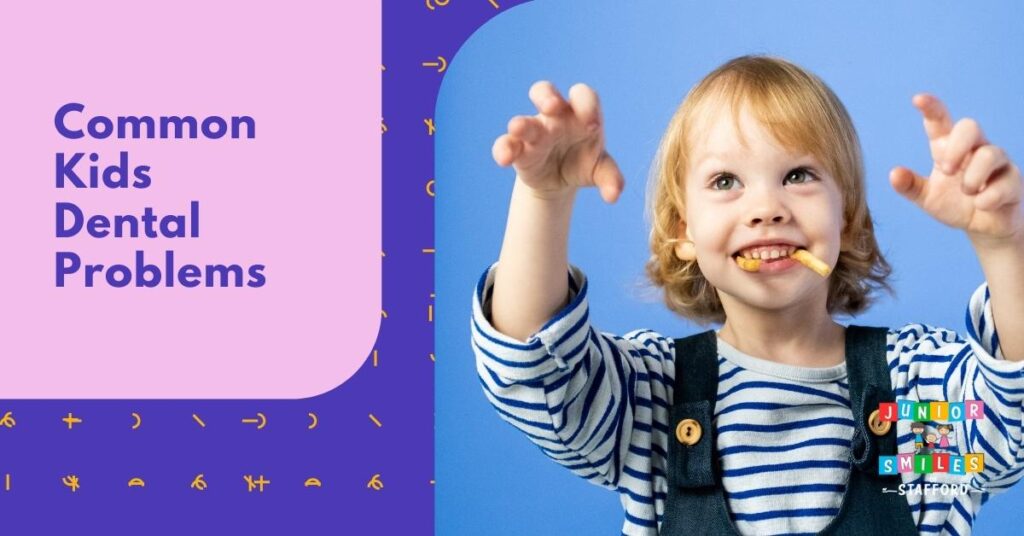5 Common Kids Dental Problems

Being a child means being free; thus, childhood is a time to explore and be adventurous. Children love going and trying out things they aren’t familiar with, especially food. They love eating nonstop, particularly sweets- sweet drinks, candies, name it, they would go for it.
Because a child’s teeth are still forming and therefore softer and younger than the permanent ones, many of the dental issues affecting adults also affect children. Dental disorders that go untreated can lead to a crooked or a broken tooth in children, leading to more significant oral hygiene issues as they get older.
Some of the most common oral health issues that children face are cavities and gum disease, thumb-sucking, tongue thrusting, and lip sucking, as well as early tooth loss. Even though a child’s baby teeth will eventually be replaced by permanent teeth, maintaining the condition of their baby teeth is critical to their general health and well-being. Educating yourself and your child about typical pediatric dental issues and the reasons for their occurrence will enable you to take preventative measures.
Here are the five most common dental problems kids encounter:
Bad Breath
Bad breath in kids is usually because of the food they eat. Chronic bad breath in kids, on the other hand, may point to a deeper root issue than simply consuming stinky foods.
Bacteria that dwell in the mouth are ultimately responsible for halitosis. These bacteria colonies feed on leftover food, fluid, and plaque, producing hydrogen sulfide as they do so, resulting in a foul odor in the mouth. In addition, these bacteria colonies more likely multiply at night, giving everyone a “morning breath.” You don’t have to worry if the bad breath fades after your child brushes teeth; however, if it’s still there, then there could be a more significant issue.
Gum disease, improper dental hygiene, and dry mouth are the most prevalent causes of foul breath, although chronic sinusitis, diabetes, tooth decay, and digestive difficulties are culprits behind halitosis. Additionally, if your child is taking medications, it could also cause bad breath since the way medicine breaks down in the body could produce an unusual smell. Breath freshening toothpaste can help. In addition, antibacterial mouthwash and tongue brushing may help decrease odors and combat germs in the mouth.
Proper dental hygiene and regular dental checkups are your friends when you experience this.
Thumb-sucking and Pacifier Use
Thumb-sucking and pacifier use are pretty typical with kids, and it’s not something a parent should worry about. However, if this behavior persists, it could harm your kid’s dental health. When a child’s permanent teeth begin to develop, the practice of sucking their thumb can lead to a broad range of severe dental health issues. As a result of thumb-sucking, dental alignment and the roof of the mouth might be affected.
When a child is sucking on their thumbs, harm level depends on the strength of the sucking. Around the age of four, most kids quit sucking their thumbs. However, children under five can lead to oral and speech difficulties. Immediate response to this would be helpful; contact your dentist when you notice your kid’s excessive thumb sucking. An experienced dentist can provide expert advice regarding your child’s dental situation.
Gum Disease
If you notice that your child’s teeth are receding and bleeding after flossing, they may be suffering from gingivitis, a condition where the gums become inflamed and red. Gum disease occurs when plaque and tartar build-up on the teeth roots. Poor breath and a bad taste in the mouth are other signs of gum disease in children.
Inflammation of the gum tissue is known as gingivitis. Poor oral and dental hygiene and plaque accumulation can lead to gingivitis, a condition that can cause bone deterioration and tooth loss.
Here are the three stages of gingivitis you might want to understand:
Chronic Gingivitis
The biofilm (plaque) that coats the teeth is the source of chronic gingivitis. This is common in kids. When persistent gingivitis goes untreated, the gums become inflamed and bleed easily.
Aggressive Periodontitis
Adolescent and young adolescent periodontitis are characterized by the loss of alveolar bone, one of the tissues that support the teeth.
Generalized Aggressive Periodontitis
At adolescence, generalized aggressive periodontitis can spread across the mouth. Irritated gums and loose teeth are signs of periodontitis, marked by calculus and plaque buildup.
Severe instances may necessitate a trip to the dentist for extensive cleaning and specific rinses. A dentist may prescribe antibiotics or other treatments if the infection worsens. However, you may combat gum disease through proper dental care- encourage your child to brush and floss daily. It would also help to visit a dentist.
Related: Can Pacifiers Really Damage Teeth?
Baby Tooth Loss
Losing a baby tooth is not something you should worry about since everyone gets through that natural stage. More likely, it is painless, and it is an exciting sign. Nevertheless, you may need a dentist if the tooth refuses to fall out or gives the child discomfort.
Baby teeth loss is a toddler stage of development. When a child loses their first tooth, it is usually the center front tooth. It takes between 10 and 12 years for a youngster to lose their molars, and by 13 years old, most have lost their permanent teeth.
While most loose teeth are caused by the eruption of a permanent tooth beneath the primary one, a small percentage are caused by trauma or injury to the tooth before it is ready to come out. Therefore, it is possible for a permanent tooth to form incorrectly or to be crooked if a tooth is lost early. If your child’s tooth is loose before it should be, take them to a competent dentist who will do their best to save the tooth so that the permanent teeth may grow incorrectly.
Tooth Decay
Bacteria found in the mouth are the primary cause of tooth decay. Plaque, a bacteria-based coating that forms on teeth over time, is a certainty. A tooth’s enamel, or the hard outer surface, may be eaten away by plaque if exposed to the right foods. Sticky plaque means acids are always in touch with the tooth’s surface, slowly degrading it. It is one of the most frequent long-term health problems among children in the United States. Untreated damaged or decayed teeth affect 20% of children aged 5-11 and 13% of teenagers, according to the Centers for Disease Control and Prevention (CDC).
Diets high in carbohydrates promote bacteria-forming plaque development and tooth decay. Candy, cookies, soda, and fruit juice are among the most problematic foods for children. Plaque buildup is facilitated by foods high in carbohydrates, such as pasta, rice, potatoes, and bread. Tooth decay can be aggravated by a diet high in carbohydrates and inconsistent brushing habits.
Don’t worry; you can prevent tooth decay! You may drastically reduce tooth decay in children with proper oral hygiene habits and regular trips to the dentist. Make sure your child uses fluoride-safe toothpaste and brushes twice a day and that they floss before going tonight. In addition, limit their intake of sugary foods, particularly in the hours leading up tonight.
Related: Is Fluoride Important for Kids’ Dental Health?
Why Choose Junior Smiles of Stafford?
Our Stafford, VA team is well-versed in working with clients of various ages and backgrounds. They’ll take the time to get to know you and your family’s requirements, and they’ll work with you to design a treatment plan that suits your schedule. Sealants and fluoride treatments are just two of the many preventative care options we provide to keep your mouth healthy.
About Us
Visiting Junior Smiles of Stafford means you’re in good hands when it comes to receiving high-quality care. Your child’s dental health improves with each visit, ensuring a brighter smile for years to come. In addition, we adhere to the ADA and AAPD’s guidelines for best practices.
Where Are We Located?
Phone: (540) 699-2441
Fax: (540) 699-2464
Email: info@juniorsmilesofstafford.com
Monday and Tuesday: 9:00 AM – 5:00 PM
Wednesdays and Thursdays: 8:00 AM – 4:00 PM
Fridays and Saturdays: 9:00 AM – 2:00 PM (By appointment only)
How to Book Your Kids First Appointment at Junior Smiles of Stafford
Fill out the form on our website. Within 24 hours, a member of our team will get back to you.

